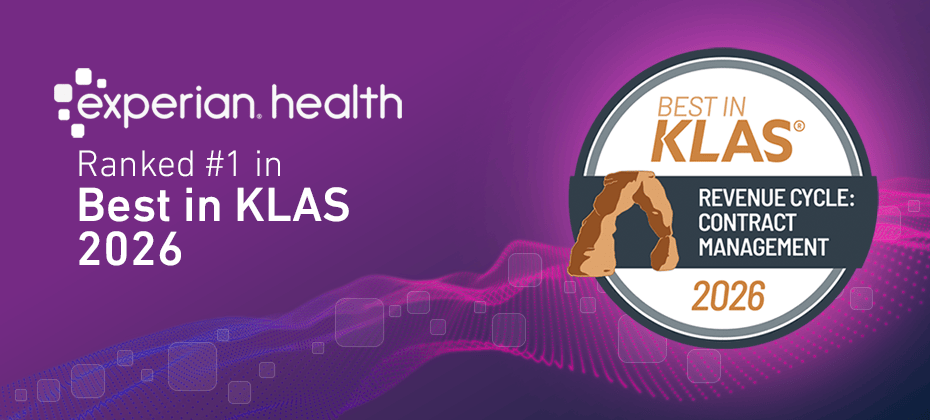At A Glance
Denied claims are rising fast, putting revenue and patient trust at risk. Automated claims management and AI-enabled tools are becoming essential for providers to reduce denials, accelerate reimbursements and improve operational efficiency.
Key takeaways:
- As claims denial rates continue to climb, pressure is mounting on healthcare organizations to find new ways to reduce denials.
- Leveraging artificial intelligence (AI) and automation-based tools, like Experian Health’s AI Advantage™ and Patient Access Curator™ solutions, is proven to lower denial rates.
- More than half of survey respondents say they’d replace existing claims management platforms if presented with compelling ROI to make the change.
Claim denials are a well-documented challenge for healthcare organizations. Denied claims take much longer to pay out than first-time claims, if they get paid at all. Each one means additional hours of rework and follow-up, pulling in extra resources as staff review payer policies and figure out what went wrong. It’s time-consuming and costly. Beyond dollars and paperwork, denials affect patient care as uncertainty about payments leads to delays in treatment or unexpected out-of-pocket costs.
But how do healthcare leaders feel about the state of claims management today? How are they tackling the administrative burden? Is there any light at the end of the denials tunnel? Experian Health surveyed 250 healthcare revenue cycle leaders to find out.
The 2025 State of Claims report breaks down the survey findings, including insights into how automation and AI technology are being used (or not!) to optimize the claims process for denial prevention and increase revenue.
What is the current denial rate for healthcare claims?
Health claims are still stuck in a cycle of denials, delays and data errors. 41% of survey respondents said that at least one in ten claims is denied. That’s a lot of rework and lost revenue that providers were counting on.
In 2009, claims processing accounted for around $210 billion in “wasted” healthcare dollars in the US. A decade later, the bill had climbed to $265 billion. Industry reports – including Experian Health’s State of Claims series – repeatedly observed a rise in denial rates.
Today, 54% of providers agree that claim denials are increasing. And with this increase, providers constantly worry about who will pay – and when.
What are the most common reasons for healthcare claim denials?
According to the State of Claim survey respondents, the top three reasons for denials are missing or inaccurate data, authorizations and inaccurate or incomplete patient info. In short? The problem is bad data.
26% say that 10% of denials result from inaccurate or incomplete data collected at patient intake. Given how much information has to be processed and organized to fill out a single claim, this isn’t surprising. From patient information to changing payer rules, the sheer volume of data points to be collected and collated creates too many opportunities for errors and omissions.
Other challenges, such as coding errors, uncovered services, eligibility checks, and staff shortages still play a role, but it’s clear that solving the data problem could make a meaningful dent in the denials problem.
Could automation improve claim denial statistics?
To help break the denial spiral, more healthcare providers are turning to claims management software. Leveraging technology helps organizations resolve or prevent the snags that interfere with claims processing and billing workflows – boost claim success rates. That said, around half of providers still review claims manually.
Yet, despite the proven benefits of integrated workflows and automation, the drive to implement new technology seems to have lost momentum.
In 2025, 41% of survey respondents say they upgraded or replaced their claims management technology in the last year. However, 56% say that their current claims technology is sufficient to address revenue cycle demands – far below the 77% in 2022.
While some tasks still genuinely require a human touch, staff time is often wasted on repetitive, process-driven activities that would be better handled through automation.
Here are a few ways claims automation can help improve claim denial statistics:
- Connect the entire claims process end-to-end: Using an automated, scalable claims management system – like ClaimSource® – helps providers manage the entire claims cycle in a single application. From importing claims files for faster processing to automatically formatting and submitting claims to payers, it simplifies the claims editing and submission process to boost productivity.
- Submit more accurate claims: 68% of survey respondents say submitting clean claims is more challenging than a year ago. There’s a strong case, then, for using an automated claim scrubbing tool to reduce errors. Claim Scrubber reviews pre-billed claims line by line so errors are caught and corrected before being submitted to the payer, resulting in fewer undercharges and denials and better use of staff time.
- Improve cash flow: Automating claim status monitoring is one way to accelerate claims processing and time to payment. Enhanced Claim Status eliminates manual follow-up so staff can process pended, returned-to-provider, denied, or zero-pay transactions as quickly as possible.
- Reduce denials: Denials Workflow Manager automates the denial process to eliminate the need for manual reviews. It helps staff identify denied claims that can be resubmitted and tracks the root causes of denials to identify trends and improve performance. It also integrates with ClaimSource, Enhanced Claim Status and Contract Manager, so staff can view claim and denial information on a single screen.
Improving claim denial statistics with AI
While automation speeds up the denials workflow by taking care of data entry, AI can examine that data and recommend next steps.
Of the 14% of survey respondents who said their organization is currently using AI, 69% say that AI solutions have boosted claims success rates, reducing denials and/or increasing the success of resubmissions.
Current ClaimSource users can now level up their entire claims management system with AI Advantage, which interprets historical claims data and payer behavior to predict and prevent denials. The video below gives a handy walk-through of how AI Advantage’s two offerings, Predict Denials and Denial Triage, can help providers respond to the growing challenge of denials.
Additionally, turnkey AI solutions, like Patient Access Curator (PAC), allow organizations to ensure claims are processed accurately from the start. Introduced in 2025, PAC is a groundbreaking tool that consolidates important functions like eligibility checks, MBI, demographics and discovery into one seamless solution – maximizing clean claims and minimizing denials, appeals and resubmissions.
Can AI break the claims denial spiral?
Technology is critical to improving claims management processes, and 59% of survey respondents say they plan to invest in claims management technology in the next six months. Leveraging AI for claims management could break the cycle of denials, but is healthcare ready to trust it?
Despite a solid understanding of AI’s potential, survey findings suggest many healthcare organizations still have concerns. According to the data, top worries include its accuracy, HIPAA compliance, the need for staff training on new technology, and AI’s understanding of payer-specific rules.
However, as claim denials continue to rise, organizations that make the leap to adopt technology-based solutions that leverage automation and AI could prevent more denials and level the playing field with payers.
Download Experian Health’s 2025 State of Claims report for an inside look at the latest claim denial statistics and industry perspectives on claims and denials management.



